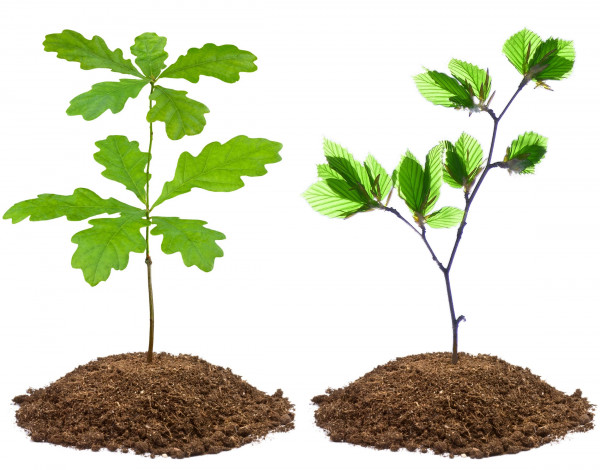2 deciduous trees on 6m² of wilderness as a gift in the ‘Heidebruch’ near Beelitz
Deciduous trees for our climate forest in the 'Heidebruch' near Beelitz
With your purchase, at least six square meters of forest area will be acquired regionally for our climate forest project "Heidebruch" near Beelitz and two resilient deciduous trees adapted to the location will be planted on it. The area will be completely removed from forestry use on a permanent basis. The trees will be allowed to live out their lives and wilderness will gradually emerge.
By the way - four deciduous trees that are no longer felled are enough to offset the average annual carbon footprint of a German citizen!
The tree species are carefully selected with professional expertise depending on the location. For the first project at the Heidebruch site near Beelitz, the tree species sessile oak, hornbeam, copper beech, sycamore maple, Norway maple, small-leaved lime and a few silver firs will be planted in an existing pine forest to break up the compacted soil of an old logging road.
Planting time is always from fall to spring, depending on the weather. We will be happy to inform you about the planting time on request. You can watch the trees grow at any time using the geodata on your certificate. The first area is an idyllic forest edge location in the Wolfsgebiet. Adjacent pastures, which are only extensively farmed, and the nearby Nieplitz river are perfect for a walk.
The area is of course protected against browsing by a game fence, and fences and plants are regularly checked by us. Free replanting in the first few years is a matter of course for us, and we provide information about our activities on this page.
It's great that you are involved!
Sessile oak
The sessile oak is extremely storm-resistant due to its strong taproot and is considered heat- and drought-resistant. It also tolerates poorly nutrient-supplied sites. As a family, it occurs predominantly with hornbeams, birches or pines.
Hornbeam
The deep-rooted hornbeam is the characteristic species of the oak-hornbeam forest association. It is considered to be drought-tolerant and storm-resistant, making it a tree that will become more important in the future against the backdrop of climate change.
Winter lime tree
It is an excellent source of nectar for bees One specimen tree can bear up to 60,000 flowers. Due to the very high sugar content of its nectar, it is a highly valued beekeeping tree.
Sweet chestnut
Because it is very adaptable and copes well with heat and dry soils, it has been considered the tree of the future for some time in view of climate change. It is the only European representative of the chestnut genus from the beech family.
Norway maple
The Norway maple is attracting increasing attention in silviculture against the backdrop of increasingly dry summers as a result of climate change. It is suitable for dry and very dry sites. The easily decomposable leaf litter is easy on the soil.
Sycamore maple
The deep-rooted sycamore is an impressive solitary plant that can live to be 600 years old. The flowers provide a rich source of nectar in spring. It serves as a valuable mixed tree species for soil improvement and ecological enrichment. European beech
European beech
The copper beech is the most common deciduous tree species in Germany, accounting for over 15% of the total, and forms an assertive root system. Under natural conditions, pure beech forests or mixed beech forests are considered the typical potential natural vegetation. On nutrient-poor sites, the sessile oak in particular is mixed in.
Silver fir
The silver fir can live to be 500 years old and is considered the "deciduous tree among the conifers". Its needles are humus-forming. It is almost more suitable than any other tree for breaking up compacted soils (old paths etc.) and tolerates drought as well as high temperatures. Therefore, a small admixture in deciduous forests can be very useful.




